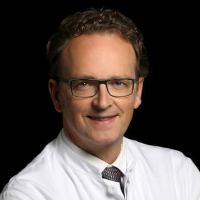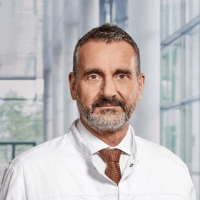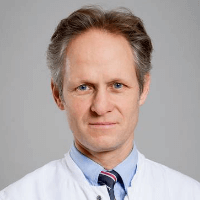Aortic Valve Stenosis with Transcatheter Aortic Valve Implantation (TAVI) in Germany
Treatment prices are regulated by national law of the corresponding countries, but can also include additional hospital coefficients. In order to receive the individual cost calculation, please send us the request and medical records.

Department of Cardiothoracic Surgery
According to the Focus magazine, the Department of Cardiothoracic Surgery ranks among the top German medical facilities specializing in the surgical treatment of diseases of the cardiovascular system and lung cancer! The department offers the full range of surgical services for the treatment of diseases of the cardiovascular system, respiratory tract, including heart and lung transplantation, artificial heart implantation. The therapeutic options include aortic surgery, coronary artery bypass grafting, transplantation surgery, surgical treatment of heart rhythm disorders (arrhythmias), minimally invasive surgery, surgical treatment of the heart valves, including reconstructive interventions. All operations are performed using state-of-the-art technology and in accordance with the current recommendations of professional societies.






Department of Cardiothoracic Surgery and Vascular Surgery
The Department of Cardiothoracic Surgery and Vascular Surgery provides effective surgical treatment for diseases of the heart, respiratory system, and blood vessels. The team of cardiac surgeons operates on patients with heart valve pathologies, coronary heart disease, heart failure, and heart rhythm disturbances. In the field of thoracic surgery, the key focus is on the surgical removal of lung tumors and lung metastases. The specialists in this area also perform surgery to repair chest wall deformities. In the field of vascular surgery, interventions for abdominal and thoracic aortic aneurysms are most often performed here. The department's vascular surgeons are also exceptionally competent in the treatment of peripheral occlusive arterial disease. A great advantage for the department's patients is that almost all surgical interventions are performed using minimally invasive techniques, so there is no need for a long postoperative recovery. The department's operating rooms are equipped with state-of-the-art technology. This allows for effective and safe treatment. The priority is always personalized medical care for patients.







Department of Cardiothoracic Surgery
According to the Focus magazine, the Department of Cardiothoracic Surgery ranks among the top German medical institutions specializing in the surgical treatment of heart diseases! The department offers the full range of first-class medical care for patients with diseases of the heart and thoracic organs that require surgical treatment. The availability in the department of advanced technical base allows for the most sparing treatment and minimally invasive surgery. The main focuses of clinical practice include coronary artery bypass grafting, modern procedures for heart valve reconstruction and replacement, treatment of diseases of the thoracic aorta, as well as treatment of heart failure by implanting an artificial heart.






Heart valve diseases often remain undetected for a long time. They usually progress slowly due to the compensatory mechanisms of the heart. Even young patients can get heart valve diseases – for example, as a result of a bacterial disease or after a heart attack. Heart valve defects require medical attention and should be treated appropriately in order to prevent further damage to the heart muscle.
Content
- Overview
- Types
- Causes
- Symptoms
- Complications
- Diagnostics
- Treatment
- Where can I undergo treatment in Germany with transcatheter aortic valve implantation (TAVI)?
- The cost of treatment in Germany with transcatheter aortic valve implantation (TAVI)
- How can I undergo treatment in Germany with transcatheter aortic valve implantation (TAVI)?
Overview
Heart valve diseases can be divided into stenosis and insufficiency. Valve stenosis is a narrowing of the heart valve due to the substitution with fibrous tissue or scarring. As a result, blood can no longer flow freely and the heart must work harder to pump it. Valve failure occurs when the valve no longer closes completely, so blood can flow back.
Aortic valve stenosis is a cardiovascular disease in which there is a narrowing of the lumen of the aorta in the area of the valve, which leads to a hampered outflow of blood from the left ventricle. It is often accompanied by reduced circulation in the coronary vessels that branch off from the aorta near it beginning.
The congenital form of the disease occurs with anomalies of prenatal development. Most often, congenital aortic valve stenosis is detected in patients younger than 30 years. As a rule, the acquired form of aortic valve stenosis occurs as a complication of rheumatism. Also, the causes include aortic atherosclerosis, Paget's disease, calcification of the aortic valve, infective endocarditis, systemic lupus erythematosus, and rheumatoid arthritis.
Types
There are several classifications of aortic valve stenosis in medicine, depending on the general state of the cardiovascular system, the location of the narrowed site, and the cause of the disease.
A combined form of aortic valve stenosis develops on the background of damage to other valves. It is often combined with aortic insufficiency and mitral stenosis (narrowing of the opening between the left chambers of the heart). An isolated form of aortic valve stenosis develops as an independent disease.
Depending on the localization of the area of narrowing, there are three forms of aortic valve stenosis:
- Valvular aortic stenosis (diagnosed in more than 60% of patients)
- Supravalvular aortic stenosis (diagnosed in up to 10% of all cases)
- Subvalvular aortic stenosis (diagnosed in about 30% of all patients with this pathology)
By origin, rheumatic (develops after rheumatism) and non-rheumatic stenosis of the aortic valve are distinguished.
Causes
The onset of aortic valve stenosis may be connected with congenital anomalies. The most common cause of aortic valve stenosis is rheumatism. It leads to deformation and fusion of the valve leaflets, which contributes to the violation of blood flow.
Also, the risk of developing the disease increases with the following conditions:
- Atherosclerosis (narrowing of the lumen of the vessel due to the deposition of fatty plaques on its walls)
- Infective endocarditis (inflammation of the inner lining of the heart)
- Connective tissue diseases (rheumatism, systemic lupus erythematosus)
- Severe impairment of kidney function
- Congenital heart anomalies
- Arterial hypertension (high blood pressure)
The risk of developing pathology increases in people prone to smoking and drinking alcohol, as well as those who consume fatty and fried foods.
Symptoms
Depending on the degree of narrowing of the vessel lumen, aortic valve stenosis may be asymptomatic or manifest itself with a vivid clinical picture. At the initial stage of development, aortic valve stenosis is not accompanied by clinical manifestations. The first symptoms occur when the diameter of the aorta narrows by about 50%.
The patient may experience:
- Shortness of breath (first after physical exertion, then at rest)
- Weakness, fatigue
- Dizziness
- Muscle weakness
As the disease progresses, more severe signs of aortic valve stenosis appear:
- Difficulty breathing, especially at night
- Fainting
- Intense pain in the heart region
In severe cases, the patient develops pulmonary edema, i.e. accumulation of fluid in the alveoli.
If the slightest disturbances in the cardiovascular system appear, it is important to visit a doctor as soon as possible. Only timely diagnosis will help doctors to administer an effective treatment for the pathology.
For many years, the pathology can stay asymptomatic. The development of clinical manifestations of aortic valve stenosis indicates an increased risk of complications. In this case, surgical treatment is often required. With the absence of therapy, the life expectancy of patients is about 2-5 years. If treatment is started timely, 85% of patients manage to overcome the 5-year survival period after a surgery. More than 70% of them can live for over 10 years.
Therefore, the prognosis for aortic valve stenosis is favorable only with the early and correct treatment. Otherwise, the disease is fatal.
Complications
At advanced stages, aortic valve stenosis can lead to the following consequences:
- Infective endocarditis
- Violation of coronary blood circulation, which leads to additional pathologies of the cardiovascular system
- Arrhythmia (heart rhythm disorder)
- Myocardial infarction (death of a part of the heart muscle)
- Sudden cardiac death (occurs mainly in elderly patients)
Only a timely examination will help to avoid the development of such complications.
Diagnostics
To reveal aortic valve stenosis, the following diagnostic methods are used:
- Anamnesis taking
- Physical examination of the patient – listening to heart sounds, determining the boundaries of the organ
- Electrocardiography (ECG)
- Ultrasound scanning of the heart
- Aortography (X-ray examination of the aorta with a contrast agent)
All diagnostic methods are selected for each patient individually.
Treatment
Treatment of severe aortic valve stenosis may be planned and urgent. Heart valve disease should be treated as early as possible, even if it does not cause any discomfort. The goal is to avoid permanent damage to the heart and prolong life.
Damage to the aortic valve is accompanied by the development of myocardial dysfunction and impaired systemic hemodynamics. The decompensation of the heart, which occurs over time, leads to the development of severe complications. Surgical replacement of the affected aortic valve allows normalizing the heart function, improving the patient's condition significantly, and increasing life expectancy.
In recent years, advances in heart surgery of defective valves have skyrocketed. And there is a lot of research in medicine that is ongoing and aimed at performing novel minimally invasive procedures.
Until now, open aortic valve implantation has been the standard of care. However, about one-third of patients with aortic valve stenosis are not candidates for such surgery due to the high risk of complications, both during the surgery and in the postoperative period. This is because aortic valve stenosis most often occurs in elderly people, who often have various concomitant diseases.
The situation in medicine has changed when transcatheter aortic valve implantation (TAVI) was introduced into clinical practice. One of the important advantages of this operation in comparison with traditional open aortic valve implantation is that this method of the treatment is low-traumatic, since the duration of TAVI procedures is shorter than with open surgery, and the postoperative period is much shorter as well.
Transcatheter aortic valve implantation (TAVI) is performed via access through the femoral artery and does not require any incisions, which significantly reduces the risk of complications. Transcatheter aortic valve implantation is performed in an equipped with X-ray operating room. Transcatheter aortic valve implantation does not require anesthesia, local anesthesia and sedation are sufficient. The doctor performs puncture and catheterization of the femoral artery. With the help of a special system of conductors and catheters, he reaches the chambers of the heart, i.e. the left ventricle and the aorta, through the coronary vessels. The position of the catheters is constantly monitored using fluoroscopy. By inflating a special balloon, the affected valve is pressed against the wall of the aorta. An artificial valve is installed in its place and immediately begins to function. On average, a patient stays in the department of cardiology for 2-3 days after transcatheter aortic valve implantation (TAVI).
Damage to the aortic valve apparatus, in particular stenosis and calcification of the leaflets, is one of the indications for implantation TAVI. A common "traditional" technique in medicine is the so-called open method. It requires opening the chest cavity – thoracotomy — and connecting the patient to a heart-lung machine. The most modern technique in medicine for the treatment of aortic valve stenosis is a unique minimally invasive surgical technique – TAVI (transcatheter aortic valve implantation).
The main advantages of the implantation TAVI technique are minimization of surgical trauma and blood loss, shorter duration of the intervention, as well as the absence of the need to connect a patient to the heart-lung machine. Transcatheter aortic valve implantation is most preferable for elderly patients and people with concomitant cardiac disorders. Currently, implantation TAVI is carried out in the leading foreign cardiology clinics.
TAVI is recommended for all patients with aortic valve stenosis and appropriate clinical indications. These minimally invasive surgical interventions can be carried out in patients with concomitant pathology of the cardiovascular system and elderly patients.
Regardless of whether a biological or artificial heart valve, there is always strict prevention of endocarditis after surgery. Scars cause blood turbulence in the heart. This increases the risk of bacteria deposition and inflammation, which can be fatal. Therefore, a prophylactic antibiotic should be taken before surgery, oral procedures (such as dental prophylaxis), and bacterial infections.
Like any other surgery, cardiovascular surgery is associated with certain risks. When planning the surgical treatment, the patient's age and medical history are taken into account. Before deciding on the method of treatment, the doctor always discusses the risks of the operation with the patient. The cardiologists believe that the benefit to the patient should outweigh the potential risks associated with the surgery.
Where can I undergo treatment in Germany with transcatheter aortic valve implantation (TAVI)?
Medical tourism is becoming more and more popular these days, as medicine in Germany often ensures a much better quality of transcatheter aortic valve implantation (TAVI).
The following hospitals show the best success rates in transcatheter aortic valve implantation (TAVI):
- University Hospital Essen
- University Hospital Oldenburg
- University Hospital Ulm
- University Hospital Frankfurt am Main
- University Hospital Tuebingen
You can find more information about the foreing medicine and European hospitals on the Booking Health website.
The cost of treatment in Germany with transcatheter aortic valve implantation (TAVI)
The prices in hospitals listed on the Booking Health website are relatively low. With Booking Health, you can undergo treatment in Germany with transcatheter aortic valve implantation (TAVI) at an affordable price.
The cost of treatment varies, as the prices depend on the hospital, the specifics of the disease, and the complexity of its treatment.
The cost of treatment of aortic valve stenosis with transcatheter aortic valve implantation (TAVI) in Germany starts with a price of 32,824 EUR.
You might want to know the cost of treatment with additional medical procedures and follow-up care, as the ultimate cost of treatment in Germany may differ from the initial price.
To find out information about the overall cost of treatment in Germany, contact us by leaving the request on the Booking Health website.
How can I undergo treatment in Germany with transcatheter aortic valve implantation (TAVI)?
It is not easy to self-organize any treatment abroad. It requires certain knowledge and expertise. Thus, it is safer, easier, and less stressful to use the services of a medical tourism agency.
As the largest and most transparent medical tourism agency in the world, Booking Health has up-to-date information about transcatheter aortic valve implantation (TAVI) in the best European hospitals. We will help you select the right medical center taking into account your wishes for treatment.
We want to help you and take on all the troubles. You can be free of unnecessary stress, while Booking Health takes care of all organizational issues regarding the treatment in Germany with transcatheter aortic valve implantation (TAVI). We provide our services so that you can undergo transcatheter aortic valve implantation (TAVI) of high quality.
Medical tourism can be easy! All you need to do is to leave a request on the Booking Health website, and our manager will contact you shortly.
Authors:
The article was edited by medical experts, board-certified doctors Dr. Nadezhda Ivanisova and Dr. Vadim Zhiliuk. For the treatment of the conditions referred to in the article, you must consult a doctor; the information in the article is not intended for self-medication!
Sources:
ECR - European Cardiology Review

